-
Posts
44,789 -
Joined
Content Type
Profiles
Blogs
Forums
American Weather
Media Demo
Store
Gallery
Everything posted by LibertyBell
-
nice to see the JFK amount went up, was that still on 0.21 liquid?
- 338 replies
-
you can't consider Philadelphia in the MidAtlantic this season, their snowfall deficit is as bad as New York City's. The entire coastal city corridor from Philadelphia to Boston is in a 7-8 inch snowfall deficit. Philadelphia only has 7.5 inches of snow this season.
-
it would be great if we could figure out what causes the repetition in the same season even with different index values lol
-
but a very sharp cut off just to our south. I remember being jealous of Boston because they got all the snow early in the season while we just had ice. Our turn came in February.
-
hopefully we get a storm out of it, one good storm is all we need
-
mother nature remembers..... whatever caused it then is still there and will cause it again
-
Unfortunately, someone always seems to be in a snow hole. Winters like 95-96 and 02-03 are extremely rare, there were no snow holes in those winters.
-
yes the first I ever heard of the south based block was when Texas froze and had all those snowstorms. It's better for them than it is for us. They get direct shots of fresh arctic air and we get stale leftovers
-
suppressed like March 2014?
-
when is it predicted to get back to 0?
-
we had a freezing ice storm with temps in the upper 20s and 2+ inches of ice here on the south shore we were on a knife's edge in 1993-94 2 degrees warmer and it would have been 25 inches of snow instead of 50. Just look at how much less Philly had than NYC or even JFK.
-
it's a combo of the storm and also the pattern (which includes the ridge and also the ridge to the west). Those storms get strong because of the pattern too.
-
right, fast flow and too many shortwaves clustered together 93-94 was similar to this (but colder, so more snow.)
-
Right, it's not the ridge doing it on its own, it's the pattern making it happen. When the pattern doesn't result in that ridge it doesn't happen, but then we get a suppressed pattern. What we are getting now are two different extremes and no middle ground. One extreme is the extreme suppressed pattern with the complete lack of a southeast ridge. The other pattern has too large of a southeast ridge and we get a cutter or a hugger. We are in a thread the needle pattern either way and neither of those outcomes is good for us. Ever look at a map of predominant storm tracks across the CONUS? You'll see a bunch of tracks to our south (suppressed) and a bunch of tracks to our north (cutters). For our area to get good snows we need more of a southwest to northeast track and just offshore. That does not happen in extreme patterns that oscillate between suppression and cutter/hugger.
-
The size of storms seems to be getting smaller too. If you look back at the 90s, we had several storms that hit us and the delmarva too, now it's turned into either/or. Why are storms getting smaller?
-
for some reason this area never gets ocean effect snow even though we have a 100 mile coastline with the ocean down here lol
- 338 replies
-
- 1
-

-
there is no chicken or egg it's everything together.
-
we went into a suppressive pattern in late winter 2014 so this might turn out correct
-
heh even wetter than I thought, 7:1 ratio lol Great for taking pictures though. If the NWS was right about the 12:1 ratio it would have been a lot more snow with that amount of liquid, around 2.5"
- 338 replies
-
Don it was a super wet snow here (trees look absolutely stunning), which I didn't expect on the northern fringe. If you can find the liquid equivalent for JFK's 1.5 inches of snow please let me know, I don't think it could have been 10:1 let alone 12:1 or more.
- 338 replies
-
Yep and it was a very wet snow, the trees look absolutely gorgeous. It looked like it wanted to get heavier but just never actually got there. It's paradoxical to me to get such a wet snow on the northern fringe of a storm lol. Usually you get very dry high ratio snow on the northern fringe. I'd love to see what the liquid equivalent was at JFK with their 1.5 measured snowfall.
- 338 replies
-
Thanks, the only report I saw was when I woke up at 5 am which had Upton's 2.0 as the highest number from Long Island.
- 338 replies
-
Same here, it was the same snowfall rate at 7:30 pm midnight 3 am, etc. Steady light to sometimes moderate snow for 8-9 hours
- 338 replies




